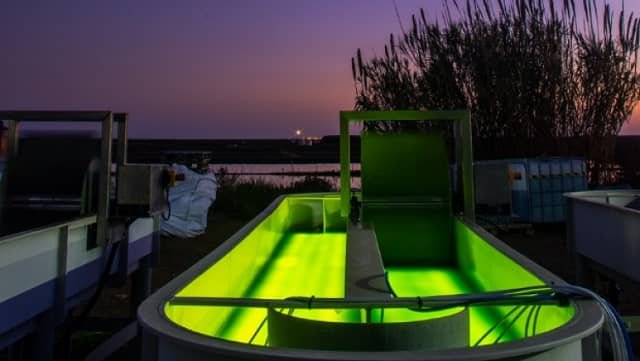by CCMAR
The demand for microalgal biomass has been increasing over the years and with it the necessity to increase their productivity. The use of LED lighting in the production of microalgae increases the growth of their biomass, especially during the night.

This study was carried out by our researchers in collaboration with Greencolab, Necton and Allmicroalgae.
Increasing demand for microalgae biomass has led to a search for new methods to increase their production
With the increasing demand for microalgal biomass for health, cosmetics and food applications, the microalgae production facilities have been studying ways to increase their production and the growth process efficiency. Until recently, microalgae were produced in open production systems. However, although this method is cheaper, it also has more disadvantages, one of them being poor light distribution.
To address this problem, our researchers Inês Maia, Tamára Santos and João Varela in collaboration with Greencolab, Necton and Allmicroalgae studied the impact and costs of integrating LED in outdoor raceway ponds.
Biomass growth with the presence of LEDs can contribute to the production of microalgae at an industrial scale
The researchers found that the use of LEDs in cultures of the microalgae Nannochloropsis oceanica increased biomass growth, especially during the night. In addition, they found that the protein and carbohydrate content also increased in the cultures that were under LED exposure. This research presents the possibility to optimize the process of microalgae production at an industrial scale.
However, the incorporation of this type of light should be mainly considered, especially in the production of high-value products, since it represents an additional cost in the production of biomass.
Reference (open access):
M. Carneiro, I.B. Maia, P. Cunha, I. Guerra, T. Magina, T. Santos, P.S.C. Schulze, H. Pereira, F.X. Malcata, J. Navalho, J. Silva, A. Otero, J. Varela. 2022. Effects of LED lighting on Nannochloropsis oceanica grown in outdoor raceway ponds. Algal Research 64(2022)102685
Stay Always Informed
Join our communities to instantly receive the most important news, reports, and analysis from the aquaculture industry.
Editor at the digital magazine AquaHoy. He holds a degree in Aquaculture Biology from the National University of Santa (UNS) and a Master’s degree in Science and Innovation Management from the Polytechnic University of Valencia, with postgraduate diplomas in Business Innovation and Innovation Management. He possesses extensive experience in the aquaculture and fisheries sector, having led the Fisheries Innovation Unit of the National Program for Innovation in Fisheries and Aquaculture (PNIPA). He has served as a senior consultant in technology watch, an innovation project formulator and advisor, and a lecturer at UNS. He is a member of the Peruvian College of Biologists and was recognized by the World Aquaculture Society (WAS) in 2016 for his contribution to aquaculture.







